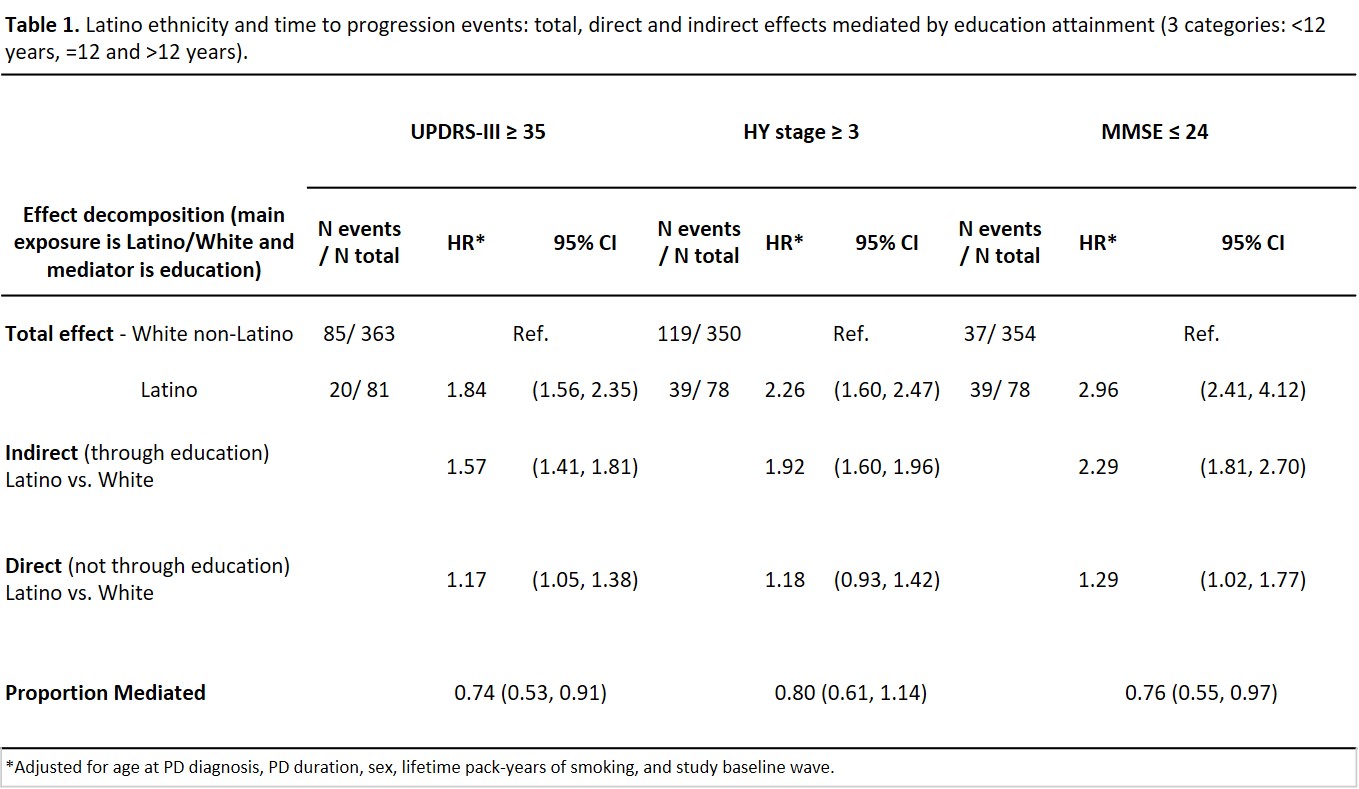Category: Epidemiology
Objective: To compare clinical progression of PD in Latino and White Non-Latino (WNL) patients enrolled in a community-based study, exploring potential disparities and what might drive them.
Background: Race and ethnicity encompass information about multiple determinants of PD heterogeneity across biological and social domains. Despite importance of understanding racial/ethnic disparities in PD, particularly in the multi-ethnic US population, most current clinical and epidemiological PD studies have enrolled predominantly WNL and no previous studies assessed heterogeneity in progression in Hispanics/Latinos.
Method: In a sample of 776 (138 Hispanic/Latino and 638 WNL) PD patients from the population-based Parkinson’s Environment and Genes Study, of whom 425 had at least one follow-up exam, we used Cox proportional hazards models (adjusted for sex, age at PD diagnosis, PD duration at follow-up, total smoking in pack-years, and study wave) to estimate hazard rate ratios (HR) and 95% CI comparing progression of motor disability (measured by UPDRS-III≥ 35 and HY≥ 3) and cognitive (MMSE≤ 24) outcomes, in Latino and WNL patients. We also performed mediation analysis to assess indirect contributions of educational attainment differences to progression in Latino/WNL patients.
Results: Latino patients were on average younger at PD diagnosis (64 vs. 69 years old in WNL), had less years of formal education (9 vs. 15 years), and a higher proportion had been employed in farming occupations (31 vs. 8%) and reported ever smoking (50 vs. 44%). Over a mean follow-up of 4.1 (±1.9) years, Latino patients had worse progression than WNL for the three outcomes considered, Table 1 shows effect estimates (HRs and 95% CIs). Education mediated most of the total effects we estimated for racial/ethnic differences. On the other hand, occupation was not an important mediator of the effects estimated.
Conclusion: This first population-based study of PD in the US to examine ethnic differences in PD progression found Latino patients to have worse motor disability and cognitive progression than WNL. This finding was to a large degree explained by disparities in educational attainment, which may operate as a proxy for healthcare access or/and other disadvantages that can impact PD symptom progression. PD clinical treatments can be enriched by incorporating psychosocial information, and our results suggest that Latino PD patients may need special attention from health services providers.
To cite this abstract in AMA style:
A. Duarte Folle, C. Kusters, K. Paul, B. Ritz, M. Flores, J. Bronstein, A. Keener. Parkinson’s Disease Clinical Progression in Latino Patients [abstract]. Mov Disord. 2021; 36 (suppl 1). https://www.mdsabstracts.org/abstract/parkinsons-disease-clinical-progression-in-latino-patients/. Accessed February 6, 2026.« Back to MDS Virtual Congress 2021
MDS Abstracts - https://www.mdsabstracts.org/abstract/parkinsons-disease-clinical-progression-in-latino-patients/

